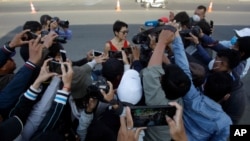Fear of physical violence and legal risks are a daily part of the job for Cambodia’s journalists, a new report says.
The Cambodian Journalists Alliance Association – also known as CamboJa – found 35 cases of harassment against 72 journalists in 2020. Imprisonment and violence were the most common press freedom violations documented by the rights organization, which was founded in 2019. Nearly all cases (64 incidents) involved journalists working at online news organizations.
“Journalists who dare to cover and report on the interests of military and powerful officials are still being persecuted through a judiciary system that uses criminal law instead of press law and have been repeatedly beaten and subjected to violence,” Nop Vy, executive director of CamboJA, said in a statement.
Meas Sophorn, a spokesperson for Cambodia’s Ministry of Information, questioned the report’s findings, saying that all journalists working in the country have “full rights and freedom to report.”
“The report has motive to distort public about the environment of journalists’ profession in Cambodia,” Meas Sophorn told VOA Khmer.
More than 20 cases documented by the group involved violent attacks or threats while reporting, the report found. In all cases, no one has been held accountable.
The report cited how four reporters were attacked by a group of men armed with knives and axes in September, leaving one journalist with a serious rib injury.
The journalists, who work for the news outlets Phnek Mnoas and Chakra Phup, told VOA at the time they regularly traveled to the region to report on illegal timber routes.
One of them, Ren Samnang, said he believes the attackers apparently went there with the intent to kill.
“They broke the [car] window and beat me,” he said. “I started the car and drove away. They followed us in their van for a kilometer and threw an ax at my car.”
Following the release of the CamboJa report, Nop Vy called on the government to “ensure the safety and security of all journalists so that they can exercise their rights to freely report without fear.”
Chilling effect
In the capital, Phnom Penh, most of the 25 violations the association recorded involved journalists arrested or facing legal action because of commentary on politics and coverage of the COVID-19 pandemic.
Overall, at least 10 journalists remained in prison or pre-trial detention at the end of last year, including Ros Sokhet, of the Cheat Khmer, and radio journalist Sok Oudom, who were convicted of incitement, according to CamboJA. Others, including former Radio Free Asia journalists Yeang Sothearin and Uon Chhin, have charges still hanging over them.
The harassment of journalists “undermines the media’s role in a democratic society and strikes fear in those who cover stories or cases involving powerful officials,” the CamboJA report said.
The association found that journalists most commonly were charged with incitement to commit felony or extortion, and it said the country’s criminal code is “too often used to intimidate and jail journalists.”
Journalists jailed under Article 495—creating “serious turmoil” through public speech or writing—can face up to five years in prison.
Government spokesperson Meas Sophorn said journalists who have been jailed had violated Cambodian laws. “The legal actions against some journalists don’t mean harassing, prosecuting or intimidating journalists,” he said.
Ith Sothoeuth, media director at the Cambodian Center for Independent Media, said the fact that more than 70 journalists have been harassed is “a concern for Cambodia press freedom.”
The country has a poor record for free expression, scoring 144 out of 180 countries, where 1 is the most free on the world press freedom index compiled by Reporters Without Borders.
This story originated in VOA’s Khmer Service.




